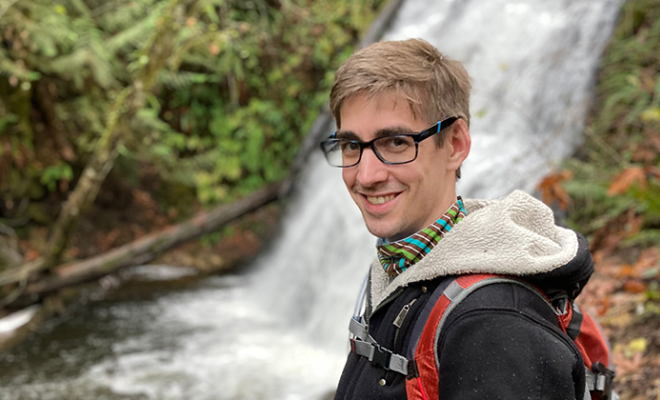I found myself crying, staring at my therapist sitting on the other end of Zoom. And it was not in a subtle sort of way where the tears prickle in the corner of your eyes, and you can sniffle your emotions away. No, this was a full-body sob, with a dripping nose and red blotchy eyes. The embarrassment tugged on me, begging to pull myself together. I didn’t understand why I was reacting this way.
“Why do you think it’s so hard for you to ask your co-workers to help you out when you’re sick?” my therapist asked.
I had not been at work for over a week because of a nasty virus. Each morning I awoke, I hoped I was feeling better and could head back to work. Instead, I was reaching out to my co-workers asking for them to cover my workload. The congestion and cough that shook my body were things I was all too familiar with — that I could handle. But the guilt I felt having other people pick up extra work for me — that was what had me crumbling.
As I dug in deeper with my therapist, I recognized these feelings of guilt had gone back much further than I thought. I had felt that same guilty feeling as a kid — leaving my friends hanging in group projects at school, watching my parents sacrifice days at work and other commitments to take care of me, and my loved ones unable to contain the worry on their faces as I would curl over in cries of coughing that would shake my body. I didn’t know it had always been there, that lingering guilt that sat like a rock in my stomach. But it had.
I tried to explain all of this to my therapist in the simplest of terms. An image flashed in my mind: me hanging onto a leash for dear life, trying to anchor my feet in one place. And on the other end of the wearing tether there was a vicious, fire-breathing dragon that I begged and screamed to obey.
“It’s like this untamable, wild dragon,” I said in my therapy session. “My whole life I’ve convinced myself that I’ve trained it. I’ve read all the books, followed every step, and taken precautions, but then it acts out, unruly, out of my control, and burning down everything in sight. But sometimes, I forget the dragon, not me, caused the destruction.”
In the days and weeks following, I couldn’t get the visions of the dragon out of my head. It was a weird comfort, an image that helped me separate myself from my disease. I started to remind myself on the hard days, “The dragon’s reign will end,” or “This is just the dragon acting out again.” But this image of the dragon continued to pull and pull on my heart. A voice inside begged me to listen to it. This pull was overwhelming, overtaking my thoughts and focus. I couldn’t stop thinking about this dragon.
It turns out that pull was 8-year-old me, longing to process more of what she had experienced. And once I fully listened to this voice, I found it calling me to process in a way that made sense to 8-year-old me and return to what I loved most: stories. And so, I started to write.
My writing journey started simply, writing about this dragon — a symbol of my loss of control. I let my heart and emotions lead with the words I put to paper.
If you were to ask me a few years ago what it was like growing up with cystic fibrosis, I would have said, “Not too bad! I was actually really lucky.” But in many ways, I hadn’t taken the time to really sit with and understand what that experience was like, so that’s what I did.
The first few drafts were very raw and unpolished, an outpouring of my heart, jumbled and messy. I tried to untangle it all the best I could — the guilt, lack of certainty, and aches of missing out and being different. But there was a certain beauty about letting the language of storytelling be my vehicle of healing, allowing me to freely explore, smearing my complicated emotions in the words without fear.
Something about the act of writing forced me to be present, to reflect and sit with each word that my fingers typed out. As someone with anxiety, my brain seems to be set in future mode — looking to tomorrow and a year from now, always planning and pondering to avoid future roadblocks and conflicts. But when I sit down and write, I anchor myself to every second, letting each word I write pin me to the moment. And so, with time, once my feelings started to simmer in my chest (and with lots of writing classes and books on the craft of writing), a story started to form.
Writing my manuscript has not only been healing, but it has also been a continued gift for me, a place to escape and fall into when life gets hard. When you have cystic fibrosis, you inevitably spend time alone — whether it be lying in bed while recovering or stepping away from your family to do vest and nebulizer treatments. And while I’m normally happy to get 30 minutes to myself during my daily treatments (thank goodness I’m an introvert), it has been so uplifting to have a fantastical world that is all my own to jump into.
Cystic fibrosis can often take things from you, but I know my imagination is here to stay, a permanent comfort that I know I can always return to.
My manuscript currently only lives on my laptop. It’s a middle-grade book about 11-year-old Ivy who has cystic fibrosis. Ivy never imagined she’d have to battle a dragon just to attend her school dance, but as the sterile walls of the hospital press in, she finds an unlikely ally in a mysterious nurse. With a cryptic piece of advice, she’s transported to a fantastical world — one where her dreams of a blissful night at the school dance could come true, but only if she survives the trials ahead.
I hope to publish my manuscript one day, one way or another. But what I’m most grateful for is the way writing helped me process and develop a better understanding of myself. There are times I still cry when the guilt tugs on my chest, and my health unexpectedly knocks me into bed for a week. But I now know that comes from a place inside me that is still 8 years old. And I know the words she needs to feel comforted. I close my eyes and picture it, separating myself from the dragon that’s blowing fire down each path in my life. I take a deep breath, put a hand on my heart, and whisper to my younger self: “This is the dragon, my dear. And as you have learned, the dragon's reign will end once again.”
Interested in sharing your story? The CF Community Blog wants to hear from you.





